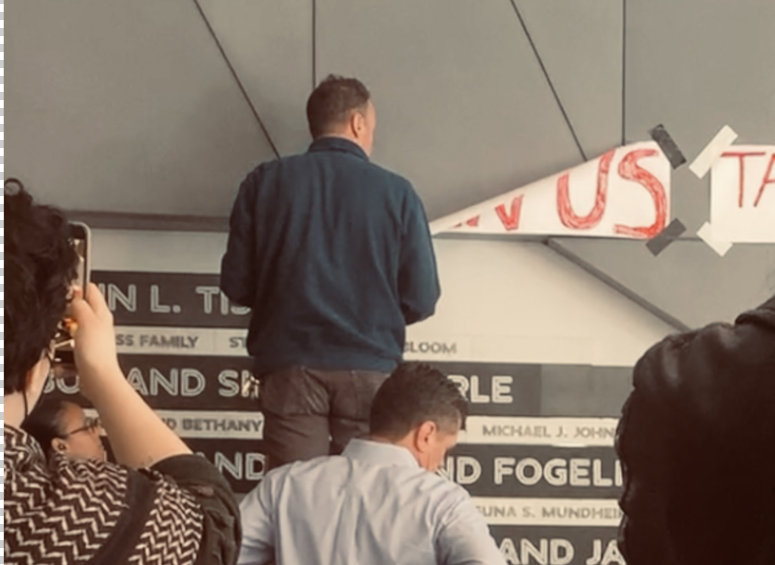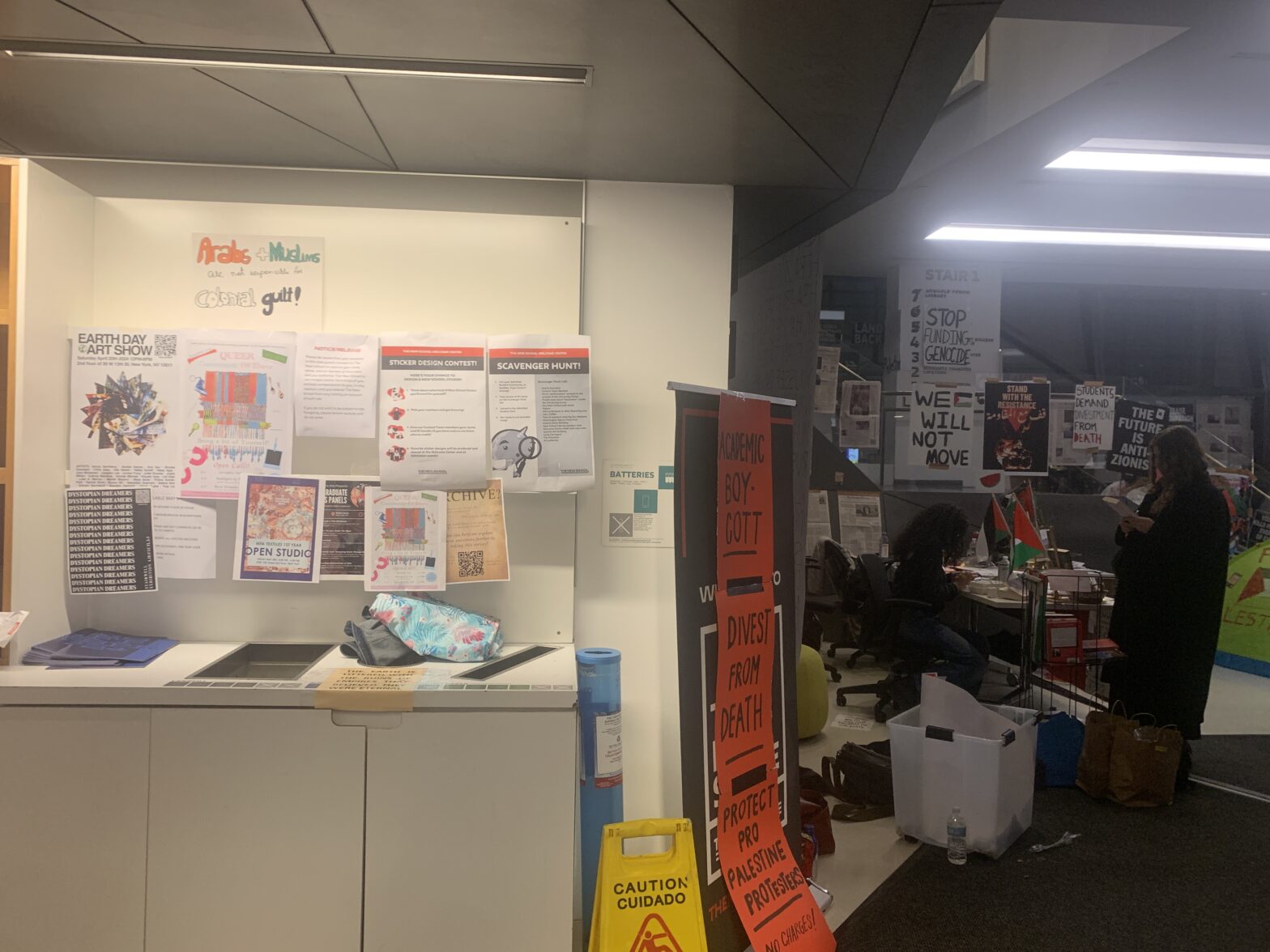The New School’s poster policy was first announced in December of last year and states that students, faculty, and staff acting in their personal capacity unrelated to New School activities cannot put up posters. Registered Student Organizations (RSOs) can put up posters, chalk, and pass out leaflets if they fill out a form to be reviewed by the Student Leadership, Involvement, and Transition Experiences (SLI-TE) office. After review, they are stamped and returned to the RSO.
But on April 22, 23, 28, and 29, members of The New School’s Facilities Management office took down and ripped The New School’s chapter of Students for Justice in Palestine (TNS SJP) posters around their encampment in the University Center lobby. Posters included photos of Palestinian martyrs, children’s drawings, and lists of encampment demands.
The New School officials who took down the posters told students that the posters violated the university’s poster policy. However, several non-SJP posters nearby were also in violation of the policy. Yet officials did not remove them.
In an email about the NYPD encampment sweep on May 3, Interim President Donna Shalala mentioned SJP’s posters stating, “As offensive as the protesters’ language and posters are to many of us, my decision is about their [protesters’] conduct, not speech.” Donna’s mention of the posters in her address about the encampment demonstrates how she and the administration see posters advocating for Palestine as a problem.
The wording of the university’s poster policy — which states that the university “may” remove posters without a stamp — allows the university to pick and choose which organizations it enforces repercussions on.
These vague rules have specifically targeted posters that have called for an end to conflict in Gaza, advocated for boycotts, divestment, and sanctions (BDS), and advertised demonstrations. The timeline of the reminders the university has put out appears to be in line with on-campus demonstrations throughout the past two semesters such as sit-ins, walkouts, and the current encampment.

TNS-SJP’s first on-campus demonstrations were on Dec. 4 and 6. A week later the poster policy was first announced Dec. 13. Beforehand there was no policy. On March 6 there was a protest against The New School at Hillel’s event which hosted an IDF lieutenant on campus. The same day there was a poster policy reminder, however this email cannot be found in several student inboxes.
Despite these emails, many students and faculty are still unaware of these updates.
“I do feel like because of all the political tensions lately … for some reason they have a certain necessity or need to sort of control that,” said Sai Ramachandran, a student assistant to the Communication Design program directors, who has put up posters for CD events before.
An anonymous part-time art history professor at Parsons School of Design questioned the timing of the new poster policy. They didn’t remember the university cracking down on posters two years ago when many demonstrated on campus in solidarity with part-time faculty who were on strike.
“It seems like this [the policy] is very clearly in direct response to the Israeli genocide of Palestine,” the professor said.
“So the hypocrisy really, even aside from art, is that Parsons builds itself as a bastion of progressivism, as a place where all different kinds of people from all around the world can come to learn the most progressive ideas about art and society, and the future. And this instance has brought out a lot of regression and a lot of resistance to actually putting our money where our mouth is.”
Under the sanctions section of the RSO Posting Policy, failure to comply with posting procedures will result in a “written letter of warning” for the first offense, “posting privileges denied for the month” for the second offense, and “posting privileges denied for a semester” for the third offense. Additionally, “individuals or groups may be denied access to campus for posting materials and may be subject to disciplinary action.”
The university poster policy also says that students violating the policy may face punishment including “removal from the university community.” There are no guidelines as to what specifically warrants extreme punishments like removal from the community and what warrants smaller punishments such as the removal of the poster.
The official list of violations are not detailed. Posters that display things such as true threats, discrimination, and harassment are prohibited. However, there is no definition of the exact parameters of terms in the policy.
In an email sent to Merrie Snead, a university spokesperson, seeking more clarity on what is considered a violation according to the poster policy, Snead mentioned nine ways a poster can violate the policy that are not specifically mentioned in the official policy. They include:
- The message asserts or implies official university approval of any viewpoints expressed.
- The message contains language or symbols which are abusive or demeaning to specific social groups.
- The message denies respect for the dignity of individuals.
- The message appears libelous.
- The message encourages the sale or use of alcohol or promotes establishments selling alcohol.
- The message encourages or seeks to incite specific illegal acts.
- The message promotes goods or services sold for personal profit or which are sold by off-campus persons or companies who are not sponsored by a university office or recognized student group.
- The message promotes non-campus related activities of commercial sponsors. Posters promoting activities and events of other non-profit institutions and organizations may be approved in limited numbers provided they do not violate the other criteria listed here.
- The poster violates any of the aspects of the university Student Code of Conduct.
The fact that these are not clearly listed in the official policy further demonstrates the lack of transparency the university has shown. The arrest of students by NYPD Strategic Response Group officers on campus on Friday and the continued NYPD presence on campus exemplifies the university’s lack of communication with its own student body. Without this communication and transparency, the university can continue to enforce this policy as it pleases and contribute to the erasure of TNS-SJP’s poster material while allowing other prohibited materials to remain on display.








Leave a Reply